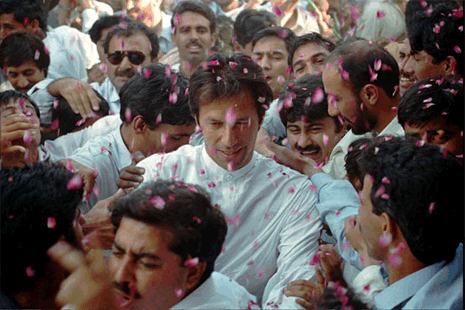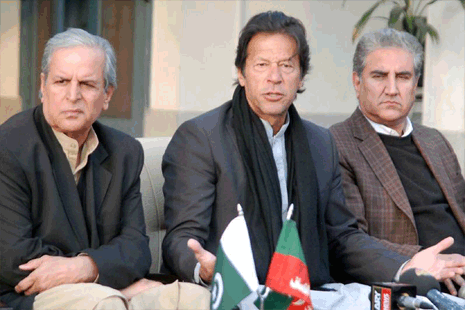Pakistan Tehrik-i-Insaf- 19 years on
In 1996, retired cricketer and philanthropist Imran Khan had formally launched his very own political party. He had chosen the name Pakistan Tehrik-i-Insaf, which means ‘Movement for Justice’. Just four years ago, Imran had propelled Pakistani cricket team to international glory by bringing home Pakistan’s lone world cup trophy.

19 years later, PTI has come a long way and has cemented an integral place for itself in Pakistani politics. Often referred to as the ‘third force’ in Pakistan’s political arena, PTI is Pakistan’s third largest political party in the National Assembly with 26 National Assembly seats, 6 Reserved seats and 1 Minority seat.
The early years of Pakistan Tehrik-i-Insaf proved to be futile for Imran Khan, as people viewed him as a neophyte in Pakistani politics. Imran’s manifesto was for the poor and destitute which directly put him at odds with the ruling elite in Pakistan. PTI contested its debut elections in 1997 and gave a miserable performance.


Then came the 2002 general elections held under Pakistan’s military dictator General Pervez Musharraf. After Nawaz Sharif’s tenure was cut short by the general in a bloodless coup, Imran had aligned himself publicly with Musharraf. PTI again failed to make a name for itself in Pakistani politics, securing only one seat and that too, from Khan’s hometown of Mianwali.

The coming years proved to be hard for PTI. After Chief Justice Iftikhar Muhammad Chaudhry was ousted by General Musharraf in 2007 and protests all around Pakistan were held against Musharraf, PTI aligned itself with anti-Musharraf forces such as PPP, PML(N), JI and ANP.

PTI had already decided not to contest 2008 elections after Chief Justice Iftikhar Muhammad Chaudhry, who was considered to be an upright judge at the time, was not re-appointed. Instead, Imran alleged that the current elections were a sham without an independent judiciary.
PTI remained in the oblivion and was not able to secure itself a prominent position in Pakistani politics until 2011. PPP’s tenure from 2008 onwards had disappointed and dejected the nation thoroughly. With Pakistan’s security entirely compromised, militancy at its peak and the economy in shambles. With opposition forces who were themselves in power at the provincial level (PML-N in Punjab and ANP in KP), the public frantically looked for an alternative force.
PTI had been growing in popularity, as people (especially the youth) flocked in huge numbers to attend PTI’s membership drive held across the urban cities. The 30th October 2011 rally of Pakistan Tehrik-i-Insaf changed the landscape of Pakistani politics. A massive gathering which filled the Minar-i-Pakistan venue in Lahore, announced PTI’s coming. Terming his political support and populist movement as a ‘tsunami’, Khan promised change in the country very soon.

With only a year and a half left in Pakistan’s general elections 2013, PTI emerged on the national scene. After its mammoth October 30th rally in 2011, respected and veteran politicians joined the party’s fold. Shah Mehmood Qureshi and Javed Hashmi, two veteran and bankable politicians, joined PTI as senior members. Everywhere PTI went, it attracted a huge following and it seemed the tide would turn in Imran’s favor as the election day neared.

Elections 2013 proved to be bittersweet for PTI. Imran’s promises of change did not come to fruition as PML-N secured a heavy mandate in Punjab and were poised to form the government with ease. PTI did not live up to the expectations it had relayed of success, yet the party swept KPK and secured a few vital seats in Punjab as well.
Pakistan Tehrik-i-Insaf had demanded that an inquiry be initiated into elections 2013 immediately after the election had concluded. After more than a year had passed and PTI’s demand of recounting in four constituencies were rejected, the party took to the streets, in a bid to topple Nawaz Sharif’s government. The protest continued for four months and neither side looked ready to give in, neither the government or PTI, when tragedy struck Pakistan. The APS Peshawar massacre left no room for Pakistan and PTI had to call off its protest movement in the larger interest of Pakistan.

PTI has contributed a lot and played a vital role (continues to do the same) in Pakistani politics till this day. Other political parties targeted the youth and female vote bank which was previously ignored and not tapped into, after PTI demonstrated their strength in these two segments of the population. Pakistan Tehrik-i-Insaf has attracted huge crowds in political gatherings and rallies across all four provinces of Pakistan. With a plethora of songs to energize the youth and rally women, it has also introduced social media into Pakistani politics. In Imran Khan, Pakistani people see a man who has the ability to safeguard Pakistan’s interests and end the corruption culture that has dominated the nation’s political scenario since its inception.

All of PTI’s plus points aside, there exists a lot of room for improvement in the party as well. Imran’s mercurial and inconsistent politics has landed PTI in trouble more than once. After renouncing any an every possible reconciliation with Nawaz Sharif, Imran not only called off his protest campaign but accepted formation of a judicial council to probe the 2013 elections. All of these notions had been rejected by PTI’s leadership time and again when they were staging their sit-in protest in Islamabad. PTI has also yet to take a dominant and positive stance against terrorism and rightist militants in Pakistan. PTI has also failed to cash in on aligning itself with opposition parties such as MQM and PPP.

It is safe to say that the party has come a long way since its inception. Though more needs to be done and PTI needs to translate its massive street popularity into electoral sturdiness, if it wants to be successful in implementing the slogan of change.

